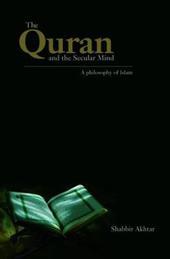
|
The Quran and the Secular Mind: A Philosophy of Islam
Paperback
Main Details
| Title |
The Quran and the Secular Mind: A Philosophy of Islam
|
| Authors and Contributors |
By (author) Shabbir Akhtar
|
| Physical Properties |
| Format:Paperback | | Pages:416 | | Dimensions(mm): Height 234,Width 156 |
|
| Category/Genre | Analytical philosophy and Logical Positivism
Philosophy of religion
Islam |
|---|
| ISBN/Barcode |
9780415437837
|
| Classifications | Dewey:297.01 |
|---|
| Audience | | Undergraduate | | Postgraduate, Research & Scholarly | |
|---|
|
Publishing Details |
| Publisher |
Taylor & Francis Ltd
|
| Imprint |
Routledge
|
| Publication Date |
31 October 2007 |
| Publication Country |
United Kingdom
|
Description
This book is concerned with the rationality and plausibility of the Muslim faith and the Qur'an, and in particular how they can be interrogated and understood through Western analytical philosophy. It also explores how Islam can successfully engage with the challenges posed by secular thinking. The Quran and the Secular Mind will be of interest to students and scholars of Islamic philosophy, philosophy of religion, Middle East studies, and political Islam.
Author Biography
Shabbir Akhtar is Assistant Professor of Philosophy at Old Dominion University in Norfolk, Virginia, USA. He has taught in the International Islamic University in Malaysia and has published widely on Islam, Christianity and current affairs.
Reviews'For both secular humanists and the religiously inclined, this innovative, challenging work will come as a pleasant surprise. Akhtar (Old Dominion Univ.) brings to this work on Islam an impressive command of Western thought from Plato and Aristotle to Kant, Hegel, and Tillich--not to mention an equally impressive command of Muslim thought, particularly on the philosophical side.' - M. Swartz, Boston University, CHOICE September 2008 "Shabbir Akhtar is a talented, thoughtful, and thorough writer who gives confidence to the committed Muslim reader that he is writing as a conscientious insider...The Quran and the Secular Mind is the result of decades of intellectual enquiry and could quite possible be referred to for years to come by all those wishing to articulate the best way to understand the Islamic tradition and its relationship to secular reason; this goes for practicing and non-practicing Mulsims and non-Muslims alike." - Amir Dastmalchian, Journal of Shi'a Studies, 2010
|